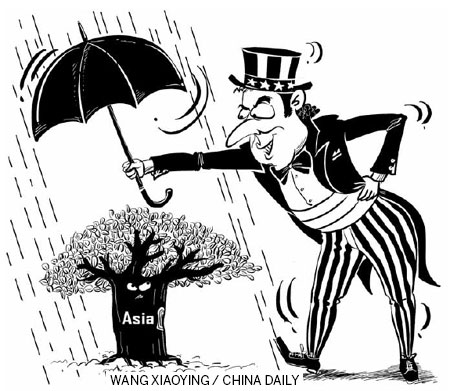Inclusive order still vital for China, US
Updated: 2015-01-15 07:39
By Li Haidong(China Daily)
|
||||||||

Delivering a keynote speech at the 25th China-US Joint Commission on Commerce and Trade session last month in Chicago, the United States, Vice-Premier Wang Yang said China was willing to join the US-led economic system, stressing that the US would continue to be the most powerful nation and that a rising China "has neither the intention nor the capability to challenge America's leading status".
"We basically accept these rules and are willing to play a constructive role in the global economic structure, established under the US leadership even before China started its reform and opening-up efforts", Wang said.
A paper recently published by Gatestone Institute, a US international policy council and think tank, has interpreted Wang's remark as a "dramatic change of heart by the Chinese leadership", which earlier "seemed extremely suspicious of America's hegemonic role in the world". Titled "China's New International Mindset?", the paper concludes that "China seems to have realized the extreme difficulty of simply barging into a world already shaped by centuries of traditions alien to it".
Unlike what Gatestone Institute has done, Wang's remark should be seen as a fair sum-up of Sino-US relations since 1978, the year when China launched reform and opening-up. China's notable economic success over three and half decades lies mainly in its effective integration into the global economy. In other words, China has benefited much from international economic rules, even though they are more or less "made in the US".
A country's foreign policy should be based on the clear understanding of its strength. The truth is, a constantly rising China still needs a long time to catch up with the US, whose GDP and military expenditure in 2014 were twice and four times that of China.
On the diplomatic front, the US has about 40 formal allies, while there is hardly a country that can be said to be an ally of non-aligned China. In addition, the US' unparalleled development of new technologies and innovation capacity, along with its overpowering advantage in use of the "global language" of English, have further consolidated its leading role in global governance.
Making such facts clear is in the interest of China, whose powerful rise in recent years has been wrongly interpreted most of the times. For China, the ideal thing to do would be to quieten the voices at home that underestimate the recovery of the US economy, and alleviate Washington's concerns over the supposed challenges posed by Beijing.
- Inspection teams to cover all of military in anti-corruption drive
- Tornado, heavy rain batters Central China's Hunan
- Beijing's five-year plan: Cut population, boost infrastructure
- Palace Museum discovers relics buried for over 600 years
- Disney promises ‘safe, pleasing service of high quality’
- Couple detained for selling their two sons
- Rousseff: Accusations against her 'untruthful'
- Almost one-sixth of Brazil's confirmed microcephaly cases linked to Zika
- Impeachment trial against Rousseff recommended to senate
- With nomination secured, Trump to aim all guns at Hillary Clinton
- Obama sips Flint water, urges children be tested for lead
- Massive protests against Abe mark Japan's Constitution Memorial Day

 Raging wildfire spreads to more areas in west Canada
Raging wildfire spreads to more areas in west Canada
 World's first rose museum to open in Beijing
World's first rose museum to open in Beijing
 Teapot craftsman makes innovation, passes down techniques
Teapot craftsman makes innovation, passes down techniques
 Top 8 iOS apps recommend for mothers
Top 8 iOS apps recommend for mothers
 Five things you may not know about the Start of Summer
Five things you may not know about the Start of Summer
 Art imagines celebrities as seniors
Art imagines celebrities as seniors
 Japanese animator Miyazaki's shop a big hit in Shanghai
Japanese animator Miyazaki's shop a big hit in Shanghai
 Star Wars Day celebrated around world
Star Wars Day celebrated around world
Most Viewed
Editor's Picks

|

|

|

|

|

|
Today's Top News
Liang avoids jail in shooting death
China's finance minister addresses ratings downgrade
Duke alumni visit Chinese Embassy
Marriott unlikely to top Anbang offer for Starwood: Observers
Chinese biopharma debuts on Nasdaq
What ends Jeb Bush's White House hopes
Investigation for Nicolas's campaign
Will US-ASEAN meeting be good for region?
US Weekly

|

|







